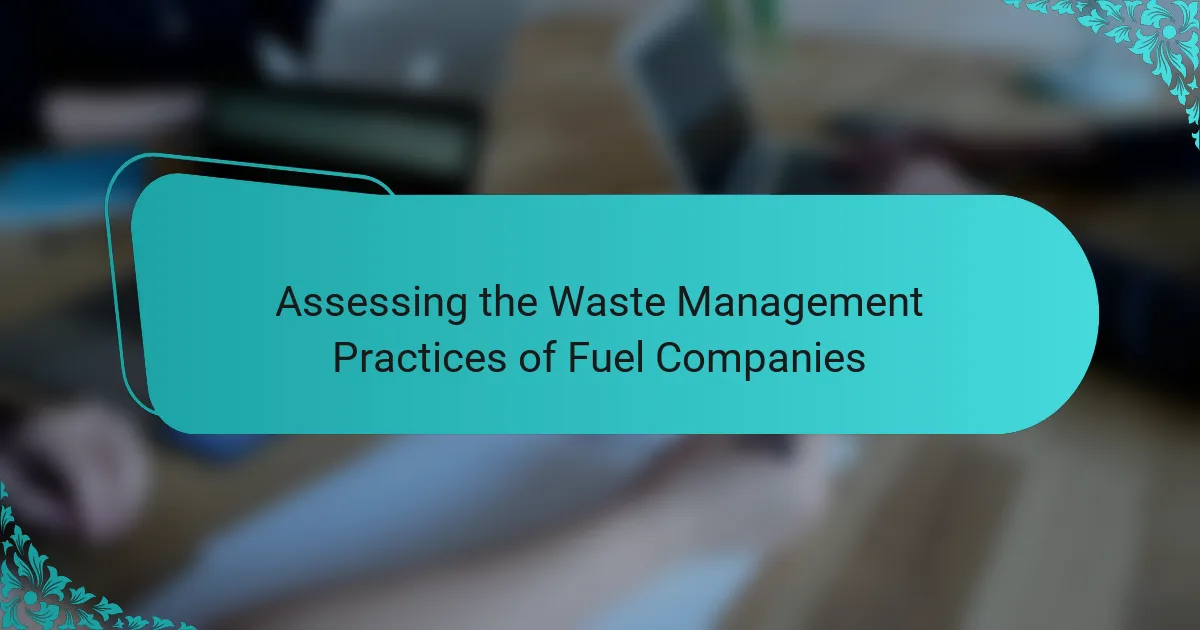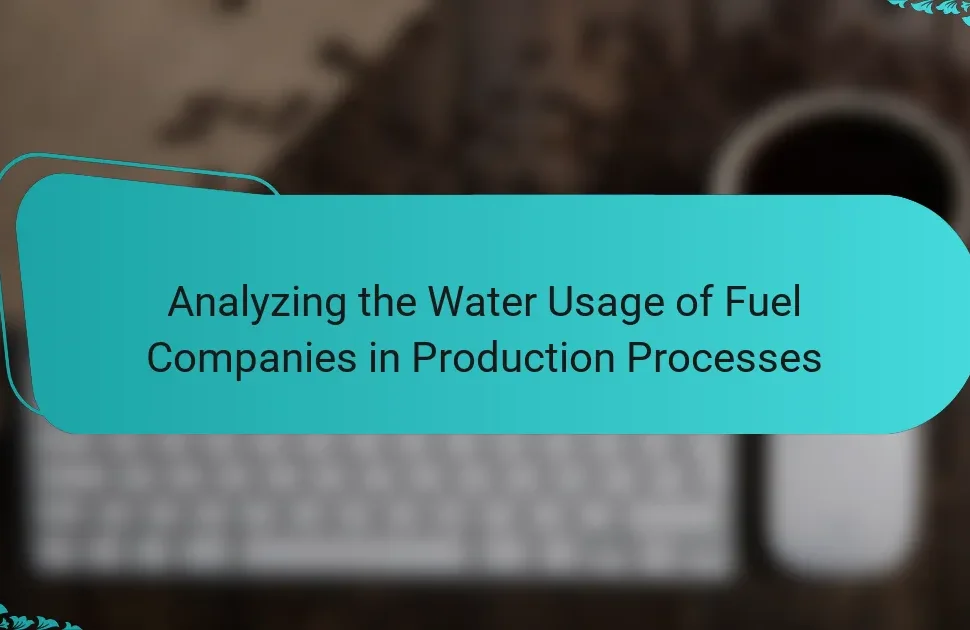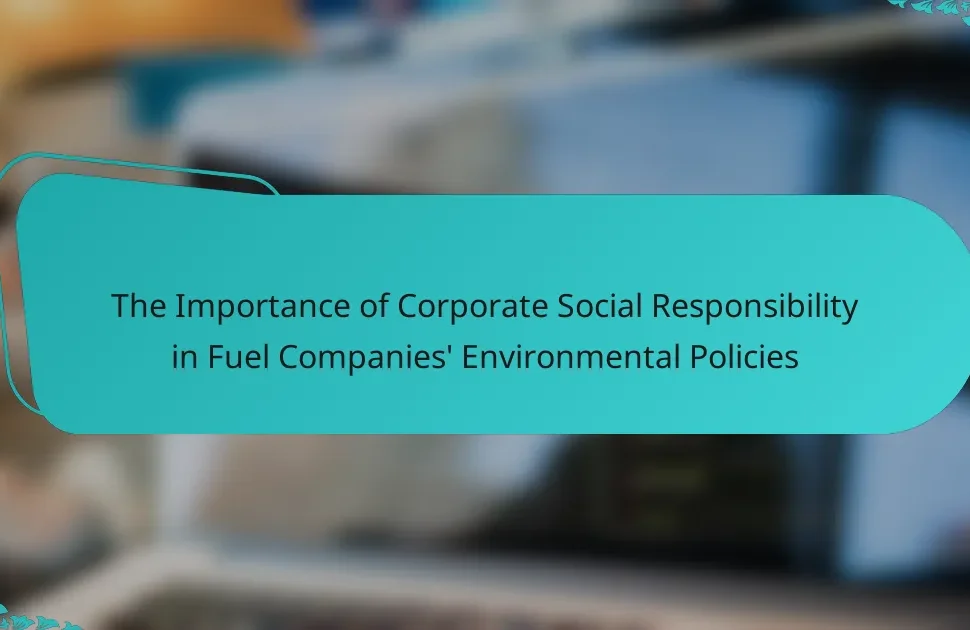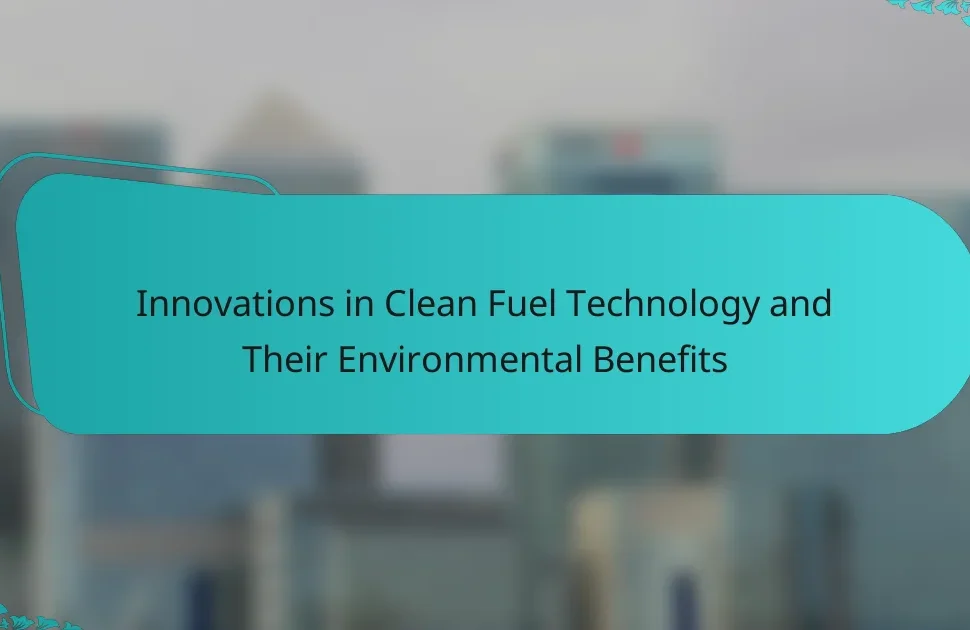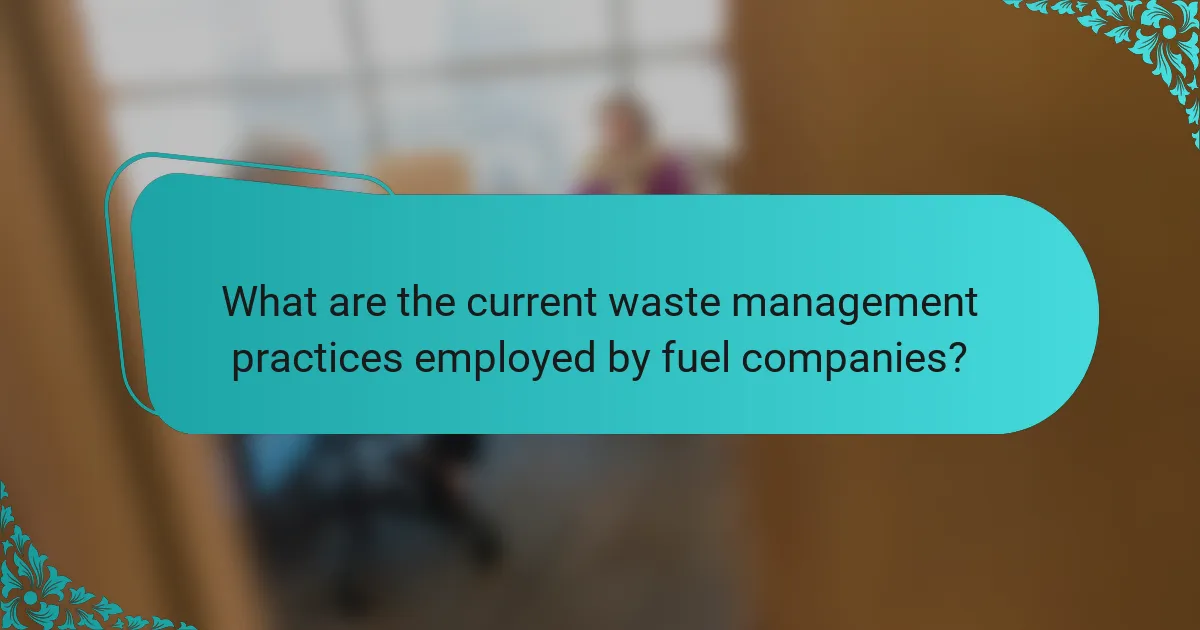
What are the current waste management practices employed by fuel companies?
Fuel companies employ several waste management practices to minimize environmental impact. These practices include waste minimization, recycling, and treatment of hazardous waste.
Waste minimization focuses on reducing the volume and toxicity of waste generated. Fuel companies implement efficient processes to limit waste production. Recycling practices involve reusing materials from waste, such as metals and plastics. This helps conserve resources and reduce landfill use.
Treatment of hazardous waste is crucial for compliance with regulations. Fuel companies utilize methods like incineration, chemical treatment, and secure landfill disposal. These methods ensure safe handling and disposal of harmful substances.
Additionally, many fuel companies engage in regular audits to assess waste management efficiency. They also invest in training employees on best practices for waste handling. These strategies collectively aim to enhance sustainability and reduce the ecological footprint of fuel operations.
How do fuel companies manage hazardous waste?
Fuel companies manage hazardous waste through a series of systematic processes. These processes include identification, classification, storage, treatment, and disposal of hazardous materials. Fuel companies first identify hazardous waste based on its properties and potential risks. They classify waste according to regulations, ensuring proper handling.
Storage facilities are designed to contain hazardous waste securely. These facilities must comply with safety regulations to prevent leaks and spills. Treatment methods vary and may include chemical neutralization, incineration, or recycling. After treatment, waste is either disposed of in landfills or reused in other processes.
Regulatory compliance is crucial in managing hazardous waste. Companies must adhere to local, state, and federal regulations. Regular audits and inspections ensure that these practices are followed diligently. Effective management minimizes environmental impact and promotes safety.
What types of hazardous waste are produced by fuel companies?
Fuel companies produce several types of hazardous waste. These include used oil, spent solvents, and contaminated soil. Additionally, they generate wastewater containing toxic substances. Heavy metals and volatile organic compounds are common in these wastes. Fuel companies also produce sludge from oil refining processes. Each type of waste requires specific management practices to mitigate environmental impact. Regulatory frameworks exist to govern the disposal of these hazardous materials. Compliance with these regulations is crucial for environmental protection.
What methods are used for the disposal of hazardous waste?
The methods used for the disposal of hazardous waste include incineration, landfilling, and treatment processes. Incineration involves burning hazardous waste at high temperatures, reducing it to ash and gases. This method effectively eliminates organic compounds and minimizes waste volume. Landfilling is another method where hazardous waste is placed in specially designed landfills. These landfills are engineered to prevent leachate from contaminating groundwater. Treatment processes include chemical neutralization, which alters the chemical composition of hazardous substances to render them safe. Other treatment methods involve physical separation and biological processes. Each method is regulated to ensure safety and compliance with environmental laws.
What are the regulatory requirements for waste management in the fuel industry?
The regulatory requirements for waste management in the fuel industry include adherence to federal and state regulations. The Resource Conservation and Recovery Act (RCRA) establishes guidelines for hazardous waste management. Fuel companies must identify, classify, and manage waste according to these guidelines. They are required to obtain permits for waste treatment, storage, and disposal. Compliance with the Clean Water Act is also necessary to prevent contamination of water sources. Additionally, companies must maintain records of waste generation and disposal practices. Regular inspections and reporting to regulatory bodies are mandated to ensure compliance. These requirements aim to minimize environmental impact and protect public health.
How do regulations impact waste management strategies?
Regulations significantly influence waste management strategies. They establish legal requirements for waste disposal, recycling, and treatment. Compliance with regulations ensures that fuel companies minimize environmental impact. Regulations can mandate specific waste reduction targets. This encourages companies to adopt innovative waste management practices. For instance, the Resource Conservation and Recovery Act (RCRA) in the U.S. regulates hazardous waste. It requires proper tracking and disposal methods to protect public health and the environment. Additionally, regulations can impose penalties for non-compliance. This creates a financial incentive for companies to improve their waste management strategies. Overall, regulations drive accountability and promote sustainable practices in waste management.
What are the consequences of non-compliance with waste management regulations?
Non-compliance with waste management regulations can lead to significant legal and financial repercussions. Companies may face hefty fines and penalties imposed by regulatory agencies. In some cases, non-compliance can result in criminal charges against responsible individuals. Environmental damage caused by improper waste disposal can lead to costly remediation efforts. Additionally, businesses may suffer reputational harm, impacting customer trust and sales. Regulatory violations can also result in the suspension or revocation of operational licenses. According to the Environmental Protection Agency, violations can lead to fines ranging from thousands to millions of dollars. Overall, the consequences of non-compliance are severe and multi-faceted, affecting both the company and the environment.
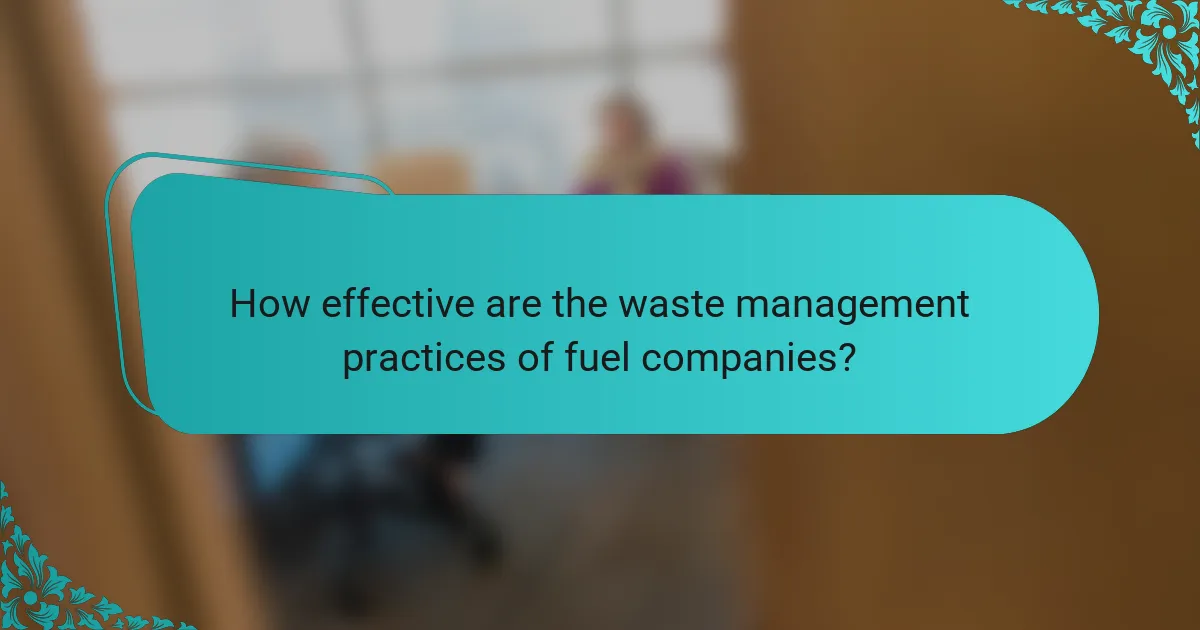
How effective are the waste management practices of fuel companies?
The waste management practices of fuel companies are generally effective but vary significantly by company and region. Many fuel companies implement comprehensive waste management systems that include recycling, treatment, and safe disposal of hazardous materials. For instance, a report by the International Energy Agency highlights that leading companies have reduced waste generation by 20% over the past decade. Additionally, regulations in regions such as the European Union enforce strict compliance, enhancing overall effectiveness. However, some companies still struggle with waste management, particularly in less regulated areas. In these instances, environmental audits reveal deficiencies in waste tracking and disposal methods. Overall, while many fuel companies exhibit strong waste management practices, inconsistencies remain across the industry.
What metrics are used to assess the effectiveness of waste management?
Metrics used to assess the effectiveness of waste management include waste diversion rates, recycling rates, and landfill diversion rates. Waste diversion rates measure the percentage of waste materials diverted from landfills. Recycling rates indicate the amount of waste that is processed and reused. Landfill diversion rates assess how much waste is redirected from disposal in landfills. Additional metrics include the cost-effectiveness of waste management programs and the environmental impact, such as reductions in greenhouse gas emissions. These metrics provide a comprehensive view of waste management performance and sustainability efforts.
How is waste reduction measured in fuel companies?
Waste reduction in fuel companies is measured through various metrics. These include the volume of waste generated, recycling rates, and waste diversion percentages. Companies track the amount of hazardous and non-hazardous waste produced annually. They also assess the effectiveness of waste management programs. Key performance indicators often include reductions in waste per unit of production. Benchmarking against industry standards helps evaluate progress. Regular audits and reports provide insights into waste management efficiency. Data collection methods include surveys and waste composition analysis. These practices enable fuel companies to identify areas for improvement and implement strategies for waste reduction.
What role does recycling play in waste management effectiveness?
Recycling significantly enhances waste management effectiveness by reducing the volume of waste sent to landfills. It conserves natural resources by reusing materials, which decreases the need for new raw materials. According to the Environmental Protection Agency (EPA), recycling and composting prevented the release of 186 million metric tons of carbon dioxide equivalent into the air in 2013. This reduction in greenhouse gas emissions contributes to a healthier environment. Additionally, recycling creates jobs in the recycling and manufacturing industries. The National Recycling Coalition states that recycling creates 1.17 million jobs in the United States. Overall, recycling plays a crucial role in promoting sustainability and resource conservation in waste management.
What challenges do fuel companies face in waste management?
Fuel companies face several challenges in waste management. Regulatory compliance is a significant issue. These companies must adhere to strict environmental laws and regulations. Failure to comply can result in hefty fines and legal complications. Another challenge is the safe disposal of hazardous waste. Fuel companies generate waste that can be toxic or harmful to the environment. Proper treatment and disposal methods are necessary to mitigate these risks.
Logistical issues also arise in waste management. Transporting waste to treatment facilities can be complex and costly. Additionally, there is often a lack of infrastructure for effective waste processing. Fuel companies may struggle to find suitable facilities that can handle their waste types. Economic factors further complicate waste management. The costs associated with waste disposal and treatment can impact a company’s profitability.
Lastly, public perception plays a role in waste management challenges. Companies face scrutiny from communities and environmental groups. Negative public sentiment can lead to reputational damage and affect operations. These challenges collectively hinder fuel companies’ ability to manage waste effectively.
How do economic factors influence waste management practices?
Economic factors significantly influence waste management practices by determining the resources allocated for waste handling. Budget constraints often lead to reduced investment in advanced waste management technologies. Companies with more financial resources can implement better recycling and waste reduction strategies. Economic incentives, such as subsidies or tax breaks, encourage firms to adopt environmentally friendly practices. Conversely, high disposal costs can prompt companies to seek innovative waste reduction solutions. Market demand for sustainable practices also drives companies to enhance their waste management efforts. Research indicates that organizations with strong economic backing tend to outperform others in waste management efficiency.
What technological barriers exist in waste management for fuel companies?
Technological barriers in waste management for fuel companies include insufficient recycling technologies, lack of advanced sorting systems, and inadequate waste-to-energy conversion methods. These limitations hinder the effective processing of various waste types. For instance, traditional recycling methods may not efficiently handle complex materials found in fuel industry waste. Advanced sorting systems, like AI-driven technologies, are not widely implemented, leading to contamination in recycling streams. Additionally, many fuel companies lack access to state-of-the-art waste-to-energy technologies, which can convert waste into usable energy. This results in increased landfill usage and environmental impact. According to a report by the International Energy Agency, only 10% of waste from fuel companies is converted into energy, highlighting the need for improved technologies in waste management.
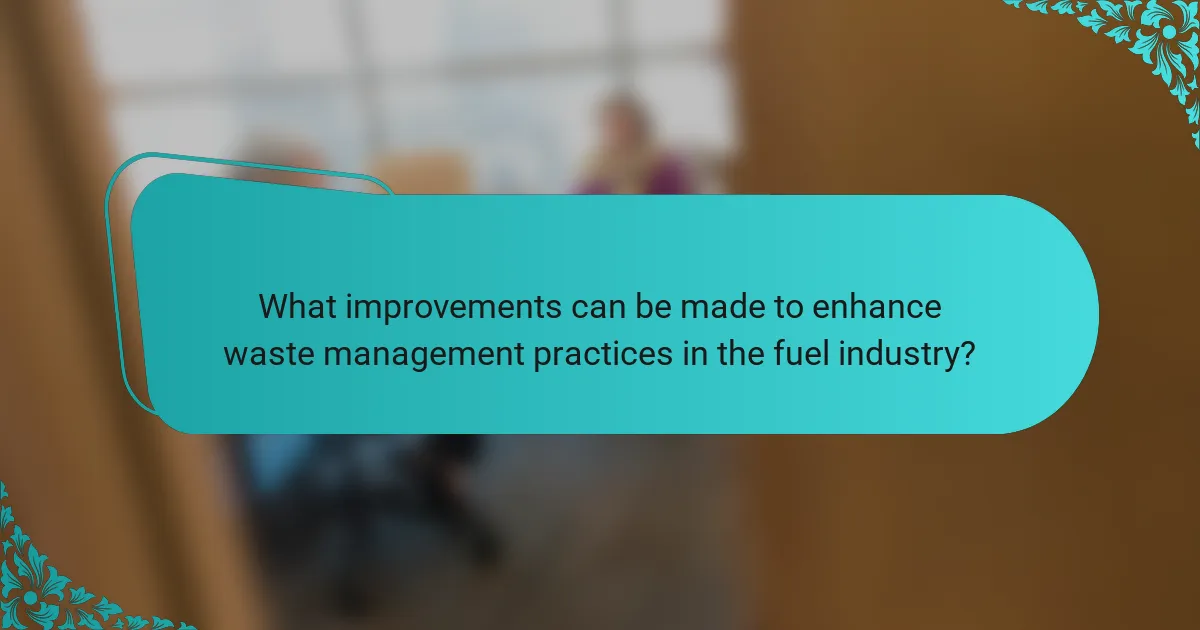
What improvements can be made to enhance waste management practices in the fuel industry?
Implementing advanced recycling technologies can enhance waste management practices in the fuel industry. These technologies can convert waste materials into usable products, reducing landfill usage. Additionally, adopting stricter regulations on waste disposal can ensure compliance and accountability among companies. Training employees on waste segregation and management is also crucial. Proper training can lead to more effective waste handling and reduced contamination. Furthermore, investing in waste-to-energy systems can provide sustainable energy solutions while minimizing waste. Regular audits of waste management processes can identify inefficiencies and areas for improvement. Collaboration with environmental agencies can promote best practices and innovation in waste management.
What innovative technologies are available for waste management?
Innovative technologies available for waste management include anaerobic digestion, advanced recycling, and waste-to-energy systems. Anaerobic digestion converts organic waste into biogas and digestate. This process reduces landfill waste and generates renewable energy. Advanced recycling technologies, such as chemical recycling, break down plastics into their original monomers. This allows for the creation of new plastic products, reducing reliance on virgin materials. Waste-to-energy systems convert non-recyclable waste into usable energy through combustion or gasification. These technologies help minimize waste and provide alternative energy sources. According to the U.S. Environmental Protection Agency, waste-to-energy facilities can reduce waste volume by up to 90%.
How can automation improve waste management efficiency?
Automation can significantly improve waste management efficiency by streamlining processes and reducing human error. Automated systems can monitor waste levels in real-time, optimizing collection schedules. This leads to fewer unnecessary trips and lower fuel consumption. Robotics can also sort waste more accurately than manual labor, enhancing recycling rates. For instance, automated sorting facilities can achieve up to 99% accuracy in material separation. Additionally, data analytics can predict waste generation patterns, allowing for proactive management strategies. These improvements not only save costs but also minimize environmental impact. Studies have shown that automation can reduce operational costs by up to 30% in waste management.
What are the benefits of adopting sustainable waste management practices?
Adopting sustainable waste management practices reduces environmental impact and promotes resource conservation. These practices minimize landfill use, decreasing greenhouse gas emissions. They also enhance recycling and recovery rates, leading to less waste in landfills. According to the Environmental Protection Agency, recycling and composting prevented the release of 186 million metric tons of carbon dioxide equivalent into the air in 2018. Sustainable practices can also lead to cost savings for companies by reducing disposal fees and improving operational efficiency. Furthermore, they can enhance a company’s reputation and customer loyalty, as consumers increasingly prefer environmentally responsible brands.
What best practices should fuel companies implement for better waste management?
Fuel companies should implement a waste management hierarchy that prioritizes waste reduction, reuse, and recycling. This approach minimizes waste generation and maximizes resource efficiency. Companies can conduct regular waste audits to identify areas for improvement. Tracking waste generation data helps in setting measurable goals.
Investing in employee training fosters a culture of sustainability. Educating staff on proper waste disposal and recycling practices is essential. Collaborating with waste management firms enhances disposal methods. Utilizing technology can streamline waste tracking and reporting processes.
According to the Environmental Protection Agency (EPA), reducing waste at the source is the most effective strategy. Implementing these best practices can lead to significant environmental benefits and cost savings.
How can fuel companies engage stakeholders in waste management efforts?
Fuel companies can engage stakeholders in waste management efforts through collaboration and communication. They should establish partnerships with local governments and environmental organizations. This can facilitate resource sharing and joint initiatives. Regular stakeholder meetings can help in discussing waste management strategies. Transparency in reporting waste management performance builds trust with stakeholders. Providing educational resources on waste reduction can empower community involvement. Implementing feedback mechanisms allows stakeholders to voice concerns and suggestions. Engaging employees in waste management programs fosters a culture of responsibility. These actions can lead to improved waste management practices and stakeholder satisfaction.
What role does employee training play in effective waste management?
Employee training plays a crucial role in effective waste management within fuel companies. It equips employees with the knowledge to identify waste types accurately. Training ensures that staff understand proper disposal methods and recycling protocols. This knowledge reduces contamination and increases recycling rates. Furthermore, trained employees are more likely to comply with regulations. Compliance minimizes legal risks and potential fines. Studies show that organizations with comprehensive training programs see a 30% reduction in waste generation. Thus, employee training directly enhances operational efficiency and environmental sustainability in waste management.
What are the future trends in waste management for fuel companies?
Future trends in waste management for fuel companies focus on sustainability and resource recovery. Companies are increasingly adopting circular economy principles. This involves reusing waste materials to create new products. Advanced recycling technologies are being implemented to enhance efficiency. Waste-to-energy processes are gaining traction, converting waste into usable energy. Regulations are tightening, pushing companies towards greener practices. Digital technologies like IoT are improving waste tracking and management. Collaboration with stakeholders is becoming essential for innovative solutions. These trends reflect a shift towards environmentally responsible waste management in the fuel sector.
The main entity of the article is the waste management practices of fuel companies. The article provides a comprehensive overview of current practices, including waste minimization, recycling, and hazardous waste treatment, while emphasizing the importance of regulatory compliance. It discusses the types of hazardous waste generated, disposal methods, and the impact of regulations on waste management strategies. Additionally, the article highlights challenges faced by fuel companies, metrics for assessing effectiveness, and future trends towards sustainability and resource recovery in waste management.
